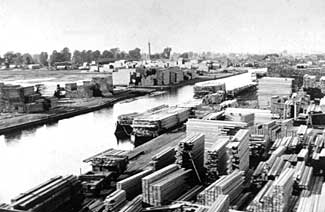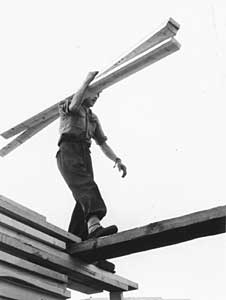 Timber
Trade Timber
Trade
Timber merchants
imported sawn deals and some large baulks, mainly softwoods, and
these were stored in open yards on both sides of the canal to the
south of Gloucester. Large storage areas were needed because imports
were concentrated during the summer and autumn when the supply ports
were free of ice. Most of the timber merchants had their own steam-powered
saw mills with machinery to cut the wood to size and plane it to
suit customers requirements. A few businesses also used the wood
to make finished products. (Photo: Glos Archives)
 Handling
Timber Handling
Timber
When a ship or a lighter
arrived at a Gloucester timber yard, a gang of men were employed
to carry the deals to be piled up in the yard. Two men lifted one
or more deals on to another man's shoulder, and he ran along a line
of planks to the pile where that size of deal was being stacked.
A leather pad was worn to protect the shoulder, but it could still
be very painful until the skin became hardened. As the planks flexed
when the carrier ran over them, he had to develop a knack of allowing
for that movement or he could be thrown off.
When the carrier reached the right
pile, he dropped his load, and another man positioned each deal
tidily while the carrier ran back for more. Meanwhile the next carrier
arrived and dropped his load - and so on. It was very hard work,
but those who were fit enough to do it were comparatively well paid.
When the wood was sold, the process was reversed and the deals were
loaded into railway wagons or canal boats to be sent away.
Baulks of timber were usually left
floating in the canal or in special ponds to avoid the wood drying
out and cracking. When needed, they were lifted out by crane.
Principal Firms in the Timber Trade in the 19th Century
- Thomas Adams & Co
- Ashbee Sons & Co
- Barkworth & Spaldin
- John Bland & Co
- Booth & Co
- John Forster
- Robert Heane & Co
- S J Moreland & Sons - match makers
- Nicks & Co
- Price & Co later Price Walker & Co
- J M Shipton
- Benjamin N Tripp
|
 Timber
Trade
Timber
Trade Handling
Timber
Handling
Timber